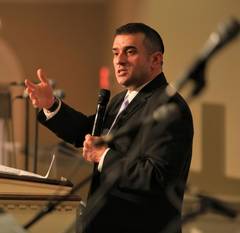- About Us
- Learning
- Resources
- Get Involved
- Membership
- Jobs
Kedoshim - Community
05/07/2019 01:51:18 PM
| Author | |
| Date Added | |
| Automatically create summary | |
| Summary |
 In Parshat Kedoshim, which we will read this coming Shabbat morning, the Holy One instructs Moses to say to the entire Israelite community: "You shall be holy for I, the Lord your God, am holy."
In Parshat Kedoshim, which we will read this coming Shabbat morning, the Holy One instructs Moses to say to the entire Israelite community: "You shall be holy for I, the Lord your God, am holy."
The instruction is addressed in the plural, not to Moses and not to the elite, but to the entire community, because holiness is a project for the group, not the individual. The command is not for an isolated ascetic on a remote desert island nor is it written for a lone Jew in suburbia; it is written as a blueprint for an entire community - the priests, the common folk, the widows, the orphans, and the strangers.
After that first overarching assertion: "All of you - be holy!!" the Torah's laws come fast and furious, each offering another disparate instruction - revere your parents, reprove your kinsman, leave the surplus of your crops for the poor and the stranger. And the list continues - don't steal, don't lie or take false oaths, don't mock the deaf or place a stumbling block before the blind. Do this, but don't do that. Do not profit from the blood of your neighbor and love your neighbor as yourself.
Taken as a whole, these instructions say very clearly: "Be in community!" More than any given dictate, the core of Parshat Kedoshim, and perhaps the entire Torah, is the idea that the Jewish people are to form a holy society and recognize the obligations each one has to the other.
Although it is very important, the community's role is not simply to provide for the material needs of the indigent, but to build a social structure which includes everyone. This holy society is not a federation of individuals who have come together because it's an efficient way to work for their various goals; rather, being part of a community, whether rich or poor, is part of what it is to be holy.
In a lengthy discussion about the persistence of poverty, the Talmudic Rabbi Akiba said now is the time not only to feed the poor, but to break your bread with them, and bring them into your house. There are many significant, important ways to care for the poor, including donations for their material well-being and advocacy for their political well-being. Indeed, those important activities bring us closer to the religious ideal of justice. But "All of you - be holy!!" demands not only that we provide for the material well-being of the needy and seek justice, but that we take the poor and the suffering into our hearts and into our homes in order to pursue holiness.
Parshat Kedoshim tells us that holiness is not, and cannot be an individual activity. None of us can operate without regard for the weakest members of our community and think we are doing right and good in the eyes of God. A religious community that is not concerned with the widow, the orphan and the stranger is neither religious nor a community. It is a group of loners playacting as Jews.
Wed, October 15 2025
23 Tishrei 5786
RABBI BRENT SPODEK

Join Our Mailing List
Privacy Settings | Privacy Policy | Member Terms
©2025 All rights reserved. Find out more about ShulCloud


